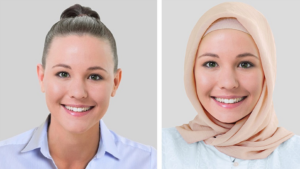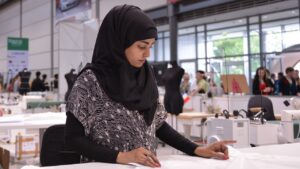Researchers conducted a field experiment to demonstrate that veiled Muslim women encounter public backlash from clients and consumers when looking for jobs in the Netherlands and Germany.
Three universities—Oxford University in the UK, Utrecht University in the Netherlands, and the German Center for Integration and Migration Research—conducted a joint field study on the prejudice faced by religious minorities looking for work in the three European labor markets of Germany, the Netherlands, and Spain.
The results of the study were published in the European Sociological Review. The researchers selected a group of applicants and submitted two job applications for each of them to conduct the study. One wore a headscarf and highlighted their religion by working at a religious facility, while the other was without a headscarf and had no connection to Islam. A direct client-customer service was required in the job ads, such as hairdresser, shop assistant, or sales representative.

In the Netherlands, nearly 70% of employment applications with no mention of religious affiliation received a favorable response. But the acceptance percentage was only 35% for applications that included pictures of applicants wearing a headscarf. Similarly, in Germany, employers gave a good response to 53% of Muslim women who did not wear the headscarf, compared to 25% of callbacks for women who wore them.
The researchers said that the high level of discrimination they discovered in the Netherlands, where the institutional environment has historically been tolerant of the rights of religious minorities, is particularly shocking and suggests that recent immigration-related policies may have a stigmatizing effect. The level of prejudice towards women who wear the headscarf in Spain was, however, essentially minimal.

The latest findings supported earlier research that suggested veiled Muslim women faced disadvantages in the work market. According to research by Cornell University’s Doris Weichselbaumer, in 2019 discrimination against women who wear the hijab and who have non-German names that suggest immigrant backgrounds also existed in Germany. The identical applicant’s callback rate for a job interview with a German name and unveiled photo was 18.8%, compared to only 13.5 percent for the same candidate with a Turkish name and unveiled photo.
Injections Without Needles – Dutch researchers find a way to end biggest fear of hospitals
The area of all applications with the highest level of discrimination was the combination of a Turkish name and a headscarf, with a call-back rate of only 4.2%. The most recent study, which was published in the journal European Sociological Review, adds that Muslim job applicants who are dressed religiously may also experience discrimination in interviews for positions that do not need direct consumer contact. Employers generally exhibited resistance to any form of religious attire, including that worn by men, the study noted.
- Misleading Video Alters Prime Minister Shehbaz’s Speech Targeting Political Rival, Not His Party - 21/04/2024
- ATC Grants Three-Day Remand for Suspects in Ichhra Bazaar Harassment Case - 19/03/2024
- Pakistan, India, and Bangladesh Lead World in Severe Smog Crisis, Exceeding WHO Guidelines - 19/03/2024


